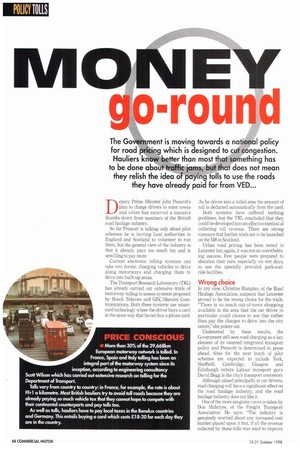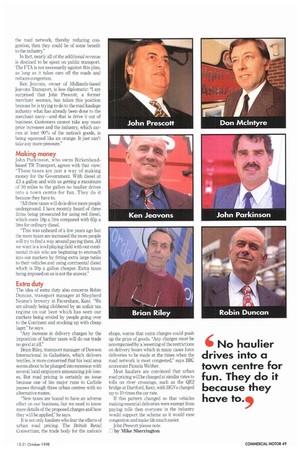MONEY go-round
Page 50

Page 51

If you've noticed an error in this article please click here to report it so we can fix it.
The Government is moving towards a national policy for road pricing which is designed to cut congestion. Hauliers know beer than most that something has to be done about traffic jams, but that does not mean they relish the idea of paying tolls to use the roads they have already paid for from VED...
Deputy Prime Minister John Prescott's plan to charge drivers to enter towns and cities has received a massive thumbs-down from members of the British road haulage industry'.
So far Prescott is talking only about pilot schemes: he is inviting local authorities in England and Scotland to volunteer to run them, but the general view of the industry is that it already pays too much tax and is unwilling to pay more.
Current electronic tolling systems can take two forms: charging vehicles to drive along motorways and charging them to drive into built-up areas.
The Transport Research Laboratory (TRL) has already carried out extensive trials of motorway tolling to assess systems proposed by Bosch Telecom and GEC-Marconi Communications. Both these systems use smartcard technology where the driver buys a card in the same way that he can buy a phone card. As he drives into a tolled area the amount of toll is deducted automatically from the card.
Both systems have suffered teething problems, but the TRL concluded that they could be developed into an effective method of collecting toll revenue. There are strong rumours that further trials are to be launched on the M8 in Scotland.
Urban road pricing has been tested in Leicester but, again, it was not an overwhelming success. Few people were prepared to abandon their cars, especially on wet days, to use the specially provided park-andride facilities.
Wrong choice
In any case, Christine Rampley, of the Road Haulage Association, suspects that Leicester proved to be the wrong choice for the trials. "There is so much out-of-town shopping available in the area that the car driver in particular could choose to use that rather than pay the charges to drive into the city centre," she points out.
Undeterred by these results, the Government still sees road charging as a key element of its vaunted integrated transport policy and Prescott is determined to press ahead. Sites for the next batch of pilot schemes are expected to include York, Sheffield, Cambridge, Glasgow and Edinburgh (where Labour transport guru David Begg is the city's transport convenor).
Although aimed principally at car drivers, road charging will have a significant effect on the road haulage industry, and the road haulage industry does not like it.
One of the more sanguine views is taken by Don McIntyre, of the Freight Transport Association. He says: The industry is genuinely worried about any increased cost burden placed upon it but, if all the revenue collected by these tolls was used to improve the road network, thereby reducing congestion, then they could be of some benefit to the industry."
In fact, nearly all of the additional revenue is destined to be spent on public transport. The VIA is not necessarily against this plan, as long as it takes cars off the roads and reduces congestion.
Ken leavons, owner of Midlands-based Jeavons Transport, is less diplomatic: "I am surprised that John Prescott, a former merchant seaman, has taken this position because he is trying to do to the road haulage industry what has already been done to the merchant navy—and that is drive it out of business. Customers cannot take any more price increases and the industry, which carries at least 90% of the nation's goods, is being squeezed like an orange. It just can't take any more pressure."
Making money
John Parkinson, who owns Birkenheadbased TR Transport, agrees with that view: "These taxes are just a way of making money for the Government. With diesel at .,C3 a gallon and with us getting a maximum of 10 miles to the gallon no haulier drives into a town centre for fun. They do it because they have to.
"All these taxes will do is drive more people underground. I have recently heard of three firms being prosecuted for using red diesel, which costs 18p a litre compared with 65p a litre for ordinary diesel.
"This was unheard of a few years ago but the more taxes are increased the more people will try to find a way around paying them. All we want is a level playing field with our continental rivals who are beginning to encroach into our markets by fitting extra large tanks to their vehicles and using continental diesel which is 20p a gallon cheaper. Extra taxes being imposed on us is not the answer."
Extra duty
The idea of extra duty also concerns Robin Duncan. transport manager at Shepherd Neame's brewery in Faversham, Kent. "We are already being clobbered by an unfair tax regime on our beer which has seen our markets being eroded by people going over to the Continent and stocking up with cheap lager," he says.
Any increase in delivery charges by the imposition of further taxes will do our trade no good at all."
Brian Riley, transport manager of Dawson international in Galashiels, which delivers textiles, is more concerned that his local area seems about to be plunged into recession with several local employers announcing job losses. But road pricing is certainly an issue because one of his major runs to Carlisle passes through three urban centres with no alternative routes.
"New taxes are bound to have an adverse effect on our business, but we need to know more details of the proposed charges and how they will be applied;" he says.
It is not only hauliers who fear the effects of urban road pricing. The British Retail Consortium, the trade body for the nation's shops, warns that extra charges could push up the price of goods, "Any charges must be accompanied by a lessening of the restrictions on delivery hours which in many cases force deliveries to be made at the times when the road network is most congested," says BRC economist Pamela Webber.
Most hauliers are convinced that urban road pricing will be charged at similar rates to tolls on river crossings, such as the QE2 bridge at Dartford, Kent, with HGlis charged up to 10 times the car rate.
If this pattern changed so that vehicles making essential deliveries were exempt from paying tolls then everyone in the industry would support the scheme as it would ease congestion and make life much easier.
John Prescott please note.
I-1 by Mike Sherrington PRICE CONSCIOUS
More than 30% of the 39,668km European motorway network is tolled. In France, Spain and Itch tolling has been an integral part of the motorway system since its inception, according to engineering consultancy Scott Wilson which has carried out extensive research on tolling for the Department of Transport.
Tolls vary from country to country: in France, for example, the rote is about FFrl a kilometre. Most British hauliers try to avoid toll roads because they are already paying so much vehicle tax that they cannot hope to compete with their continental counterparts and pay tolls too.
As well as tolls, hauliers have to pay local taxes in the Benelux countries and Germany. This entails buying a card which costs £18-20 for each day they are in the country.




















































































































